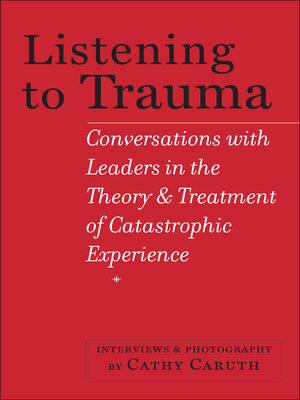Listening to Trauma
ebook ∣ Conversations with Leaders in the Theory and Treatment of Catastrophic Experience
By Cathy Caruth

Sign up to save your library
With an OverDrive account, you can save your favorite libraries for at-a-glance information about availability. Find out more about OverDrive accounts.
Find this title in Libby, the library reading app by OverDrive.



Search for a digital library with this title
Title found at these libraries:
| Loading... |
Interviews and intimate photographic portraits of witnesses to the collective and cultural significance of trauma.
This new collection from Cathy Caruth features interviews with a diverse group of leaders in the theorization of, and response to, traumatic experience in the twentieth and twenty-first centuries. Crossing the boundaries of discipline and profession, Caruth's subjects include literary theorists and critics, psychoanalysts, psychiatrists, psychologists, political activists, filmmakers, public intellectuals, institutional leaders, and researchers. Exploring the intertwining of the intellectual and personal dimensions of experience, each interview is accompanied by Caruth's intimate photographic portrait of its subject.
Caruth chose her subjects because of their impact on her thinking as well as their significant role as witnesses to the collective and cultural significance of trauma. The individuals profiled here are innovators in the theory of trauma (Part I), in the clinical, activist, or testimonial interventions in trauma (Part II), or in the creation or modification of institutions that provide therapeutic, artistic, or legal responses to traumatic events (Part III).
Two of the interviews first appeared in Caruth's landmark 1995 work, Trauma: Explorations in Memory. The rest were conducted between 2011 and 2013 after the field of trauma studies expanded significantly.
Representing both the foundation of trauma research and cutting-edge approaches to the topic, this collection will be useful to practitioners with an interest in post-traumatic stress disorder as well as scholars exploring the multiple dimensions of profound human experience.
A portion of the proceeds from sales of this book will go to the Grady Nia Project for abused, suicidal, and low-income African American women.






